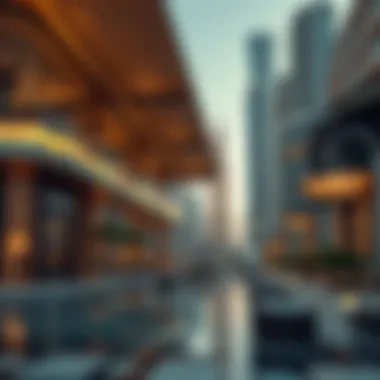Navigating Life as an Expat in Dubai


Intro
Nestled on the southeastern edge of the Arabian Peninsula, Dubai stands as a beacon of opportunity for expatriates from all walks of life. With its stunning skyline punctuated by iconic structures like the Burj Khalifa and a coastline that boasts pristine beaches, this vibrant metropolis attracts individuals seeking not just employment but a new life entirely. In this bustling city, the expatriate community plays a crucial role in shaping the social, economic, and cultural fabric that defines modern Dubai. As we delve into this exploration, we will highlight the challenges and triumphs faced by expats, along with the realities they encounter in navigating the property market and understanding local policies.
Property Market Overview
Current Market Trends
In a city renowned for its luxurious lifestyle and economic dynamism, the property market represents one of the most compelling facets for expatriates. Over the past few years, Dubai’s real estate sector has seen considerable fluctuations, influenced by both local and global economic factors. Currently, the market is showing signs of recovery after a dip, with prices stabilizing and even beginning to inch upwards in certain areas.
As of late 2023, analysts note a distinct trend toward devoting attention to affordable housing. With many expats looking for budget-friendly options, the rise of mid-range developments in neighborhoods such as Jumeirah Village Circle and Al Furjan is particularly notable. Investors might find it worthwhile to examine these areas closely as they offer attractive returns in the flourishing rental market.
Key Neighborhood Insights
When choosing where to reside, expatriates should consider a range of neighborhoods that cater to varying lifestyles and budgets. Here are several key areas worth exploring:
- Downtown Dubai: This iconic area, home to the Burj Khalifa, offers luxurious apartments and an exciting lifestyle. While it is on the higher end of the price spectrum, its proximity to key attractions makes it a favorite.
- Dubai Marina: Known for its stunning waterfront views and vibrant nightlife, Dubai Marina attracts a younger demographic. Expats often appreciate its lively atmosphere and well-connected public transport.
- Arabian Ranches: For families, Arabian Ranches presents a suburban feel, complete with spacious villas and comprehensive amenities, perfect for those seeking a quieter environment.
- Deira: This historic district offers a glimpse into traditional Dubai. Here, prices tend to be lower, making it appealing for budget-conscious expats. The rich cultural experience is another draw for many.
As we navigate through the challenges faced by expatriates, it becomes evident that understanding the local property market is paramount. This will not only affect where they live but also how they integrate into the community and build their new lives in this remarkable city.
Defining the Expat Experience
Understanding the expatriate experience in Dubai is more than just a cursory glance at who lives there. It encompasses a wide array of elements, from individual stories to broader societal impacts. For those considering a move to this vibrant metropolis or those interested in investing in its dynamic real estate, grasping the nuances of the expat life is crucial.
In Dubai, expatriates contribute significantly to the economy and local culture. The term "expat" usually reflects more than just residence; it encompasses adaptation, integration, and an ongoing negotiation of identities. The diversity within the expatriate community means that different cultures and backgrounds coexist, creating a tapestry that enriches the city's identity.
Defining the expat experience in this context can provide valuable insights into how these individuals navigate daily living, social interactions, and professional landscapes. It serves as a foundation for understanding the specific challenges they face, such as cultural differences and legal matters, as well as the advantages that come with living in such a globally connected hub.
What Constitutes an Expat?
An expatriate, often shortened to "expat," typically refers to a person who resides outside their native country, often for work, study, or other long-term commitments. Expats differ from migrants in that they often retain strong ties to their home country and may even plan a return at some point. In the context of Dubai, the expat community is incredibly diverse and comprises various nationalities.
Some key aspects to consider when discussing who constitutes an expat include:
- Origin: Many expats in Dubai hail from countries like India, the Philippines, and the United Kingdom, while others may come from all over the globe.
- Purpose: While some might be in Dubai for temporary assignments, others might seek permanent relocation for career advancement or lifestyle preferences.
- Integration: Expats often work to adapt to local customs, laws, and social norms, which makes understanding their experiences even more complex.
Unlike tourists who visit for a limited time, expats seek to establish lasting connections and become part of the larger community. This distinction shapes their experience and influences how they engage with both locals and fellow expats.
Differentiating Expats from Tourists
It is essential to differentiate between tourists and expatriates to understand the dynamics of life in Dubai fully. While both groups may experience the allure of the city, their motivations and lifestyles significantly vary.
- Duration of Stay:
- Community Engagement:
- Legal Aspects:
- Tourists typically stay for a short duration, often just a few days to a couple of weeks. They visit primarily for leisure and exploration, experiencing the city's attractions and culture as brief observers.
- Expats, on the other hand, are residents who aim to settle for an extended period, often years. They engage in the local culture, form deeper relationships, and navigate the complexities of daily life.
- Tourists may attend popular events or visit iconic landmarks like the Burj Khalifa and the Dubai Mall, but their interactions usually remain surface level.
- Expats often join local organizations or community groups, thereby forming networks that offer support, friendship, and shared experiences. They may participate in social clubs that cater specifically to their interests or backgrounds.
- Tourists are subject to visa regulations that allow for temporary stays.
- Expats, through various work visas, must comply with local regulations, which often requires them to engage in the workforce and contribute to the economy.
Understanding these differences helps paint a clearer picture of the expat experience in Dubai, shedding light on the various social and economic contributions they make.
"Expatriates reshape the urban landscape in Dubai, bringing vitality and new dimensions to its global identity."
These distinctions enable investors, buyers, and developers to appreciate why expatriates are integral to the fabric of Dubai and how they might influence future developments in the region.
The Demographics of Expats in Dubai
The demographic profile of expatriates in Dubai is vital in understanding the fabric of the city. It’s not merely about numbers; it’s about the narratives behind these figures. Understanding the demographic makeup helps in recognizing the diversity that Dubai embraces. Expatriates, often viewed through a lens of statistics, contribute uniquely to the local culture, economy, and society, shaping what makes Dubai a truly global metropolis.
Nationalities Represented
Dubai thrives as a melting pot of cultures, drawing individuals from various corners of the globe. According to the latest reports, over 200 nationalities reside in Dubai, painting a colorful picture of multiculturalism. Some prominent nationalities include:
- Indians: Leading the pack, Indian expats constitute a significant portion of the population. They dominate numerous sectors, from IT to hospitality.
- Pakistanis: Another key community, Pakistani expats have established a strong presence, particularly in trading and construction.
- British: The historical ties between the UK and the UAE mean that British expats continue to make a substantial impact, especially in entrepreneurial ventures.
- Filipinos: Known for their contributions to the healthcare and service industries, Filipinos bring a vibrant culture that enriches Dubai’s social landscape.
This array of nationalities results in a rich tapestry of perspectives and experiences. The interactions among these diverse groups foster a unique cultural exchange, which not only enhances social cohesion but also creates business opportunities. This dynamic environment is attractive for investors looking to tap into varied consumer needs and preferences.


Age and Gender Trends
When dissecting the age and gender dynamics among expats, a few insights emerge that are critical for understanding the workforce and its implications for the economy.
The age distribution typically skews younger, with a considerable segment of expatriates falling between the ages of 25 to 45 years. This demographic trend is crucial as it indicates a workforce that is often more adaptable and willing to embrace new challenges. Here are a few relevant trends:
- Young Professionals: Many young foreigners are attracted to Dubai for its job opportunities, particularly in technology, finance, and hospitality sectors.
- Family-oriented Expats: There's also a growing trend of expatriates moving with families, wherein individuals over the age of 40 increasingly seek stability and quality of life.
In terms of gender, a notable shift is observable. The gender ratio is relatively balanced in many sectors, with a higher representation of women in education, healthcare, and customer service roles. This mix not only contributes to a diverse workplace but also strengthens community bonds.
With around 68% of the population being expatriates, their contributions are pivotal to Dubai’s ongoing growth and development.
Understanding these demographic aspects provides nuanced insights that go beyond simple statistics—they help investors, real estate developers, and policymakers assess the potential market and tailor their strategies effectively.
Living Conditions for Expats
The living conditions for expatriates in Dubai play a pivotal role in shaping their experiences and overall satisfaction in this bustling metropolis. With an array of choices for accommodation and a wide range of living expenses, understanding these factors becomes essential for any expat.
Expats often seek neighborhoods that not only suit their lifestyle preferences but also provide a sense of community and accessibility. Hence, it is important to dissect housing options and cost of living considerations to appreciate the nuances of expat life in Dubai.
Housing and Real Estate Options
Major Expat Neighborhoods
Dubai offers several popular neighborhoods that have become hotspots for expatriates. Areas like Dubai Marina, Jumeirah Lake Towers, and Downtown Dubai stand out for their vibrant surroundings and splendid amenities.
The Dubai Marina, for example, is known for its stunning views of the waterfront and a plethora of cafes and high-end restaurants. This location might not be the cheapest, but it is immensely appealing for many expats wanting a lifestyle full of convenience and leisure. Meanwhile, Jumeirah Lake Towers provides a mixed-use environment with an energetic feel, making it a popular residential choice among younger professionals.
Ultimately, the choice of neighborhoods significantly affects the quality of life and accessibility to work and leisure facilities. An important consideration for expats is the availability of schools and healthcare options, making neighborhoods like Arabian Ranches or Al Furjan particularly family-friendly.
Renting vs. Buying
When we dive into the gritty details of housing, the discussion inevitably turns to renting versus buying. Renting tends to be the go-to option for many newcomers, especially considering the often fluctuating nature of real estate in Dubai. Expats can find a variety of rental options ranging from modest flats to luxurious villas, accommodating different preferences and budgets.
Moreover, the rental agreements in Dubai usually provide flexibility, allowing expats to relocate easily without the long-term commitment associated with home ownership. On the flip side, buying property can be lucrative for those looking to invest in Dubai’s real estate market long-term. It allows for property appreciation over the years, giving potential financial returns. However, the initial investment can be significant, and the market volatility poses risks, especially for first-time buyers who may not be as familiar with local trends.
Cost of Living Considerations
Everyday Expenses
The cost of living in Dubai is a hot topic among expats, as it can vary wildly based on lifestyle choices. Everyday expenses such as groceries, transportation, and schooling can significantly impact monthly budgets. Expats often find that imported goods in supermarkets can be quite pricey. However, local markets frequently offer fresher produce at better prices.
Another thing to factor in is transportation; using a private car can add up quickly due to high fuel costs and parking fees, while public transport options like the metro can ease financial strain. Balancing these everyday expenses is key—prioritizing quality over quantity can lead to a more enjoyable expat experience, especially when money is tight.
Popular neighborhoods can influence these everyday expenses, as well. Areas close to work tend to command higher rent, leading to higher overall living costs.
Healthcare Costs
Healthcare costs are another significant element of the expat lifestyle in Dubai. Access to high-quality health services is one of the draws of moving to this city. However, expats must navigate the complexities of health insurance, which can vary based on their employment status and nationality.
Typically, employers provide health insurance covering medical expenses, which can range significantly based on the level of coverage. Generally, good insurance is valuable not just for peace of mind but also ensures access to the best medical facilities in the city.
While healthcare is generally affordable and offers world-class services, without proper insurance, costs can soar. Thus, making informed decisions regarding healthcare plans should be high on the priority list for new arrivals in Dubai.
"Living conditions can make or break the expat experience. Understanding the dynamics of housing, cost of living, and healthcare is essential to thriving in Dubai."
In summary, comprehending the living conditions for expats in Dubai demands an examination of housing options, lifestyle expenses, and healthcare. The balance between impactful choices regarding housing and managing everyday living costs is critical for enjoying life in this vibrant city.
Cultural Integration Challenges
Cultural integration is a cornerstone aspect of the expatriate experience, especially in a diverse metropolis such as Dubai. With myriad nationalities converging in this urban hub, understanding how to bridge cultural divides becomes paramount. The challenges faced by expats in acclimating to the local customs, values, and traditions can impact their professional and personal lives, thereby influencing how successfully they navigate their new environment. Embracing cultural integration can lead to stronger community ties and a more fulfilling experience in this dynamic city.
Navigating Cultural Differences
Social Etiquette
Social etiquette is a fundamental element that shapes interactions between expats and locals. It's not merely about manners; it's about fostering respect and understanding. One key characteristic of social etiquette in Dubai is the emphasis on politeness. Phrases such as "Inshallah" (God willing) and "Mashallah" (as God has willed) reflect respect for the divine in conversations. The practice of these phrases contributes positively to discussions, allowing smoother exchanges.


Adhering to local social norms can be beneficial; it shows a willingness to connect with the host culture. However, it can also present disadvantages, particularly if one misreads cues or inadvertently offends local customs. Expats must, therefore, pay attention to body language, greetings, and even dining practices. An interesting feature here is the role of communal gatherings, which underscore the importance of building relationships through shared meals or celebrations. This aspect of social etiquette encourages expats to engage and integrate, enriching their cultural experience in Dubai.
Religious Observances
In a city deeply rooted in Islamic traditions, religious observances play a significant role in the cultural landscape of Dubai. Understanding and respecting the nuances of local religious practices is essential for expats wishing to build rapport with their neighbors. A key characteristic of these observances is the fasting during Ramadan, which highlights self-discipline and community spirit among Muslims. For non-Muslims, partaking in Iftar meals at sunset is a deeply moving experience that fosters goodwill and understanding.
The unique feature of local religious observances is their impact on daily routines, particularly the call to prayer which influences the timing of work and professional meetings. While this can sometimes disrupt schedules, it also offers expats a chance to witness the vibrancy of local culture. Moreover, navigating various religious events adds depth to the expatriate experience, allowing individuals to gain insight into the values held dear by their Muslim counterparts.
Overcoming Language Barriers
Language proficiency can be an insurmountable hurdle for many expats. In Dubai, while English often serves as a common ground, there still exists a wide spectrum of languages spoken, reflecting the multicultural fabric of the city. The challenge lies in the nuances and dialects that can render even fluent speakers like fish out of water in certain contexts.
Moreover, different languages can stir conversations that bring communities together. Understanding phrases in Arabic, for example, can build bridges by showing respect for the local culture. Yet, miscommunication can also lead to frustration or misunderstandings. Expats must therefore cultivate not only language skills but also a certain patience and openness to learning. Joining language clubs or engaging in community classes may provide enjoyable outlets for this learning.
It's through these challenges of cultural integration that expats often find the richest rewards, building friendships, and creating a sense of belonging in Dubai.
Expats who willingly engage with the local customs, social etiquette, and religious practices will ultimately find smoother pathways in forming connections and fostering community ties.
Employment Landscape for Expats
The employment landscape for expatriates in Dubai is as vibrant and multifaceted as the city itself. With its booming economy and continuous growth, Dubai has become a hotspot for professionals seeking new opportunities. Understanding how the job market operates here is key for those looking to relocate or invest. Expats contribute significantly to various sectors, which not only enhances their livelihoods but also boosts the entire economy. This exploration will cover industries where expats flourish and essential legal considerations that come into play.
Popular Industries for Expats
In Dubai, the expat workforce engages primarily in sectors such as:
- Hospitality and Tourism: With countless hotels, resorts, and entertainment venues, this industry seeks skilled workers in management, service, and culinary roles.
- Information Technology: The demand for tech specialists has spiked, driven by the city’s push for digital transformation, making roles in programming, cybersecurity, and data science highly sought after.
- Finance and Banking: As a leading financial hub, Dubai hosts numerous banks and financial institutions where expats often hold key positions, particularly in investment banking and wealth management.
- Healthcare: With a growing population, healthcare services require an influx of professionals, including doctors, nurses, and specialists.
- Construction and Engineering: With continuous infrastructure projects, roles for engineers and project managers are abundant, catering to the city’s ambitious developments.
These industries not only offer great career prospects but also contribute to an eclectic work environment where diverse cultures collide, fostering global business relationships and innovation.
Work Visas and Legal Considerations
Navigating the legalities of work visas is crucial for expats in Dubai. Understanding the different types of work permissions available and the process to obtain them can make or break the experience of newly arrived professionals.
Types of Work Visas
In Dubai, the Employment Visa, also known as the work visa, is the most common choice. This visa allows expatriates to live and work in the UAE, bound by work contracts issued by local employers. Key characteristics include:
- Sponsorship Requirement: An employer must sponsor the visa, which means you’ll be tied to that job until visa expiry.
- Residency Benefits: Employment visas usually span three years, allowing expats to enjoy residency perks, including family sponsorship.
- Health Insurance Mandate: Employers are required to provide health insurance for their workers, which protects expatriates in case of medical emergencies.
While it does come with several advantages, the provision ties individuals to their employer, which some may view as limiting.
Application Process
Securing an Employment Visa involves several steps:
- Obtain a Job Offer: Before anything, you need a confirmed job offer from a Dubai-based employer.
- Submit Required Documents: This often includes a passport, photos, and educational qualifications provided to the employer.
- Employer's Role: Once everything is in order, the employer handles most paperwork through the Ministry of Human Resources and Emiratisation.
- Medical Examination: A health check-up is compulsory before visa issuance.
- Visa Issuance and Residency Permit: Upon approval, the visa will be stamped in the passport followed by residency registration.
The application process, while structured, might feel overwhelming. However, with meticulous attention to detail and the right organizational skills, many navigate it successfully. It’s advisable to consult with an immigration consultant or legal adviser experienced in UAE laws to ease potential hurdles.
The employment landscape in Dubai embodies a blend of opportunities and challenges. Getting familiar with both the industries leading the way and the intricacies of visa regulations can empower expats to make informed career choices while living in this dynamic city.
Social Networking and Community Building
Building connections within the expat community in Dubai is paramount for creating a sense of belonging and enhancing the overall living experience. Social networking serves as a bridge, allowing expatriates to bond over shared experiences, navigate the challenges of living in a foreign land, and foster friendships that often last a lifetime. In a city characterized by its rich multicultural fabric, engaging with others can lead to invaluable support systems and a wealth of information about local life and customs.
Establishing connections can provide numerous benefits. For one, it helps alleviate the sense of isolation that many expats might feel when they first arrive. Participating in social groups or clubs enables newcomers to discover like-minded individuals and more easily adapt to their new environment. Additionally, these communities often provide insights into practical aspects of living in Dubai, such as housing, education options, and even job opportunities, through firsthand experiences shared by fellow expats.
Networking can take various forms, from casual meet-ups to formal organizations. It's important for expats to immerse themselves in these platforms not just for social interactions but also for the opportunities they present—whether that be potential collaborations in business endeavors or access to local resources and information.
"Networking is not just about exchanging contacts; it's about planting relations."
— R. Ramesh.
This simple yet profound sentiment encapsulates the essence of building a lasting and meaningful expatriate network.
Expat Social Groups and Clubs
Expat social groups and clubs in Dubai have gained traction over the years, providing a vibrant outlet for connection. From sport leagues to book clubs, these gatherings are designed to cater to a variety of interests and professions, thus helping individuals establish common ground and encourage participation.
- Professional Groups: This includes networking associations for specific industries, allowing members to share knowledge and forge business opportunities. Examples here are the Dubai Business Women Council and the UAE British Business Group.
- Interest-Based Clubs: This counts everything from hiking groups to cooking classes, where individuals can unite over shared hobbies and spend leisure time doing what they love. These clubs often advertise on platforms like Facebook and Meetup, making it easier for expats to find and join.


In that community atmosphere, friendships blossom not only within these groups but also beyond, creating a creates an extensive web of connections.
Cultural Events and Festivals
Cultural events and festivals are a cornerstone of community building in Dubai. They not only serve to celebrate the diverse heritage of the expat community but also enhance understanding and appreciation of the local culture among expatriates.
Most events in Dubai feature a multicultural approach, showcasing food, clothing, and traditions from various countries. Key festivals include:
- Dubai Shopping Festival: More than just a retail extravaganza, it’s a showcase for various cultures through music, dance, and food stalls from around the globe.
- Eid Celebrations: For expatriates from Muslim-majority countries, participating in these festivities offers a glimpse into the rich local customs while fostering inclusivity.
- International Film Festival: This event highlights global cinema and creates a platform for cultural exchange and dialogue.
Engaging in such events helps expats not only enjoy the kaleidoscope of experiences available in Dubai but also integrate into the local society, enhancing the overall expatriate experience. The celebrations underscore the essence of community and unity, laying a foundation for more profound social ties within the host city.
Government Policies Impacting Expats
When discussing government policies impacting expats, it becomes glaringly evident that regulations can dramatically affect not just the lifestyle of expatriates in Dubai, but also the city's economy. Expats, who come from diverse backgrounds, find that these policies play a crucial role in determining their adaptability, integration into their new surroundings, and overall success in the Emirates. The interplay between local regulations and expatriate living standards can either pave the way for opportunities or throw up hurdles.
Regulations Related to Residency
Residency regulations in Dubai have undergone a metamorphosis over the past few years, tailoring themselves to attract a broader base of expats. Traditionally, the rules around obtaining residency were akin to navigating a minefield; lengthy processes and complex requirements often led to frustration. However, initiatives like the "Golden Visa" have made significant inroads, allowing for a more streamlined experience.
- Golden Visa: This is a long-term residency scheme that grants foreign nationals the right to live, work, and study in the UAE without the need for a national sponsor. It's geared towards investors, entrepreneurs, and specialized talents.
- Retirement Visa: The UAE introduced a retirement visa program to appeal to older expats looking for a place to settle. This regulation requires proof of sufficient income and can provide a much smoother transition.
- Employment-based Residency: Expats are still primarily dependent on employment for residency. The necessary work visas are usually tied to their job, making job security an essential factor for their stay.
Understanding these regulations can help potential expats prepare for life in Dubai, ensuring their residency status aligns with their personal goals and aspirations.
Recent Policy Changes
In the ever-evolving landscape of regulations, recent policy adjustments are worth noting. These changes not only reflect the UAE's ambition to remain competitive on a global stage but also showcase a willingness to adapt to the needs of its expatriate community. Here are a few highlights:
- Changes to Sponsorship Laws: The UAE government moved towards a system that allows expats to sponsor their family members more easily. This change bears significant emotional weight, as many potential movers often wrestle with the moral dilemma of leaving family behind.
- Flexibility in Employment Arrangements: Recent policies have introduced more flexibility for expats regarding job changes. Leaving a job now allows for more time to find another position without losing residency status.
- Enhanced Rights for Domestic Workers: In a bid to uplift living standards, regulations have formalized the rights of domestic workers, many of whom are expats. This reform has brought more attention to working conditions and human rights within the expat community.
These updates encapsulate a framework that shows how the local government is tuning its policies to better accommodate expats while positioning Dubai as a prime destination for global talent. The implications of these regulations extend beyond just legalities; they shape the day-to-day realities of countless individuals contributing to the tapestry of Dubai.
"Understanding the intricacies of government policies is paramount for expatriates seeking to navigate their lives in Dubai with confidence."
As investors, buyers, agents, developers, and sellers look into the expat landscape, being well-versed in these regulations and changes can be the deciding factor in making strategic decisions in a bustling market. For further information, resources like .gov.ae and expatlifeindubai.com provide extensive details on the latest policies and their impact.
Engagement with the Local Economy
The expat community in Dubai plays a pivotal role in shaping its local economy. Their active participation influences various sectors, from housing and retail to healthcare and education. Understanding this engagement can provide insights into how Dubai has transformed into a global city, attracting people from diverse backgrounds. The interconnectedness between expats and the local economy not only benefits those living in Dubai but also strengthens the overall financial landscape of the Gulf region.
Expats as Economic Contributors
Expats contribute significantly to Dubai's economy through their professional expertise and consumer behavior. The diversity in nationalities brings a wealth of talent to the city which translates into enhanced innovation across industries. According to various surveys, International expatriates contribute around 80% of the private sector workforce. This statistic exemplifies their immense importance. They hold jobs in vital sectors such as hospitality, construction, information technology, and finance.
- Employment opportunities: Expats often fill positions that require specialized skills, which are not readily available in the local labor market. This includes roles such as managing complex logistics, developing state-of-the-art software, or creating engaging marketing campaigns.
- Consumer spending: The spending power of expatriates fuels retail growth in Dubai. They contribute to the vibrant shopping scene, from luxury brands in The Dubai Mall to local markets. This spending not only supports businesses but also creates jobs in retail and service sectors.
- Financing local ventures: Many expats invest in startups and small businesses, providing the necessary capital that fosters entrepreneurship. Their diverse experience can often be the spark for new ideas, positively impacting Dubai's economic diversity.
The Role of Expats in Real Estate Investment
The expat demographic is a driving force in Dubai's real estate market. Their need for housing opens a myriad of opportunities for investors and developers. Expats often seek rental properties, which boosts the demand for residential units. This results in a steady revenue stream for landlords and property management companies.
- High rental prices attract investors: The influx of expatriates consistently pushes rental prices higher in popular neighborhoods like Jumeirah Lakes Towers and Downtown Dubai, making these areas attractive for real estate investors.
- New development projects: The demand from expats also inspires ongoing development projects within the city. Developers build new residential complexes and commercial spaces that cater specifically to this population. These projects not only create jobs but also enhance the urban landscape of the city.
"Real estate in Dubai is often considered one of the safest investments due to the steady demand from a diverse population, making the expat presence a crucial element to monitor."
- Opportunities for property management: As the expat community looks for residential options, many property management firms are set up to cater to their unique needs. This can include everything from maintenance services to rental services that focus on expat interests.
Future of Expatriate Living in Dubai
The trajectory of expatriate living in Dubai is a topic of meaningful discourse, especially considering the rapid evolution of this vibrant metropolis. As the city continues to attract a diverse mix of talent from around the globe, understanding the future holds significant implications for expats and potential investors alike. The unique dynamics of this cosmopolitan city present both challenges and opportunities, often demanding the need for adaptation and resilience. It is crucial for stakeholders to comprehend what lies ahead—be it shifts in demographics, economic landscapes, or legislative frameworks—to position themselves effectively.
Trends Shaping the Expat Community
Several key trends currently shape the expat landscape in Dubai, influencing how communities develop and integrate. Here are a few observations on these changes:
- Increasing Remote Work Opportunities: In light of recent global events, numerous companies embrace hybrid or fully remote work models. This shift may lead to more professionals moving to Dubai for its favorable lifestyle, while continuing work for firms based elsewhere. As remote work proliferates, the expat demographic may expand to include those seeking a change in scenery without needing to be tied to a local employer.
- Popularity of Flexible Housing Solutions: A rise in demand for flexible housing arrangements, such as serviced apartments or co-living spaces, reflects changing priorities among expats. Many now prefer to lease properties that allow for easier mobility, as job markets can fluctuate rapidly, and the need for stability in living arrangements becomes less consistent.
- Health and Safety Considerations: The wellness of the community is paramount, with many expats prioritizing health and safety standards in their choice of residence. This mentality will likely spur interest in areas with robust healthcare infrastructure and safe living environments, consequently affecting real estate investments.
"Understanding trends within the expat community not only helps in adapting to ever-changing conditions but also supports informed decision-making for potential investors."
Anticipating Changes in Local Policies
Local policies play a pivotal role in shaping the life of expats in Dubai. With the government's focus on promoting foreign investment and residency, there are several anticipated developments that could greatly affect expat living in the near future:
- Enhanced Residency Options: Expanded visa options for long-term residents could emerge, making it easier for expats to establish roots. The introduction of a golden visa and other similar initiatives are indicative of this trend, aimed at attracting skilled professionals from different sectors.
- Investment Incentives: As Dubai endeavors to remain competitive on a global scale, potential alterations to property laws and investment regulations might surface, making it more enticing for expats to invest in real estate. Changes may include tax reductions or streamlined processes that facilitate expat investments.
- Cultural Integration Programs: Increased support for expat communities through cultural exchange programs could offer opportunities for deeper integration. This is expected to bolster social cohesion, reduce cultural friction, and improve mutual understanding among local citizens and expatriates.
In summary, the future of expatriate living in Dubai hinges on an interplay of trends and policy changes that demand awareness and adaptability. By being attuned to these shifts, expats and investors can navigate this exciting, though complex, landscape with greater confidence.











